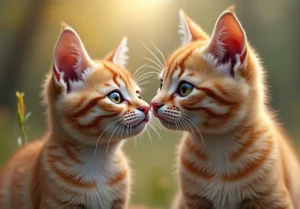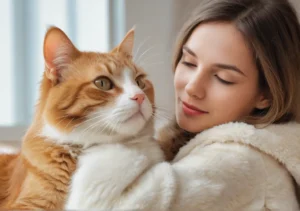Cats are notorious for their mysterious behaviors, and one common question that baffles cat owners is: why do cats eat more at night? Let’s explore the reasons behind this peculiar feline behavior.
Have you ever wondered why your cat seems to have an insatiable appetite as soon as the sun sets? The answer lies in the natural hunting instincts of cats, which are crepuscular animals that are most active during dawn and dusk. This behavior is a remnant of their wild ancestors who hunted for food during these times to avoid predators and take advantage of the cover of darkness.
Cats’ Crepuscular Nature
Cats are fascinating creatures with a unique crepuscular nature, which means they are most active during dawn and dusk. This behavior stems from their evolutionary history as hunters. In the wild, cats’ ancestors would use the cover of darkness to stalk and hunt prey efficiently.
Due to their crepuscular nature, cats have developed a preference for hunting and eating at night. Their keen senses, sharp vision in low light, and silent movements make them formidable nocturnal predators. Therefore, it’s natural for domestic cats to exhibit similar behaviors, including eating more at night.
Unique Insight: Cats’ crepuscular nature allows them to tap into their natural instincts for hunting and feeding, making the nighttime experience more enjoyable for them.
Lack of Distractions
One of the reasons cats may eat more at night is the lack of distractions. During the day, the household is often bustling with activity, which can distract cats from their meals. However, at night, the environment is quieter, creating a calm and undisturbed setting for them to focus on eating.
In the stillness of the night, cats can fully savor their meals without interruptions, leading to increased appetite and enjoyment. This undisturbed dining experience aligns with their natural instincts as solitary hunters, allowing them to indulge in their food without distractions.
For more information on cats’ feeding habits and preferences, you can check out this resource for additional insights.
Temperature Regulation
Cats are masters of staying cozy, and nighttime is no exception. As the temperatures drop, cats may find it more comfortable to indulge in a midnight snack to help keep warm. Just like how we might crave a warm cup of tea on a chilly evening, cats may naturally gravitate towards their food bowl at night to regulate their body temperature. So if you notice your feline friend chowing down in the wee hours, they might just be trying to stay toasty!
Preference for Small, Frequent Meals
Here’s a nifty little fact about our furry friends: cats are built for small, frequent meals. Their digestive systems are designed to handle multiple snacks throughout the day, which means they might feel the need to eat more at night to meet their nutritional needs. So if you see your cat making a late-night buffet run, it could be their way of ensuring they’re getting enough nutrients to keep them healthy and satisfied.
Quick Tips for Feeding Time:
- Consider portion control: Offering smaller meals more frequently throughout the day can help mimic a cat’s natural feeding behavior.
- Provide a consistent feeding schedule: Cats thrive on routine, so try to stick to a regular feeding schedule to help them feel secure and content.
- Choose high-quality cat food: Opt for a balanced diet that meets your cat’s nutritional requirements to support their overall health and well-being.
Stress and Anxiety
Some cats may experience stress or anxiety during the day, causing them to eat more at night when they feel more relaxed. Cats, like humans, can have their own worries and fears, and the hustle and bustle of the day can contribute to their stress levels. At night, when the house is quiet, they may feel more at ease and comfortable enough to eat. If you notice your cat eating more at night, consider creating a calm and peaceful environment during the day to help alleviate their stress and anxiety.
Social Behavior
Eating more at night can also be a social behavior for cats. Just like how sharing a meal can bring humans closer together, cats may use nighttime feeding as a way to bond with their owners or other pets in the household. By eating together, cats can strengthen their social connections and reinforce their sense of belonging. To enhance this bonding experience, try feeding your cat at the same time each night to establish a routine that they can look forward to.
Extra Tip:
- Interactive feeding toys: Consider using interactive feeding toys to provide mental stimulation for your cat while also promoting a sense of companionship during nighttime meals. This can satisfy their hunting instincts and provide a fun way to bond with your furry friend.
Tips for Feeding Schedule
If your cat is chowing down like it’s a midnight feast, you might need to adjust their feeding schedule to prevent those late-night munchies. One tip is to split their daily food allowance into multiple small meals throughout the day. By spreading out their meals, your cat is less likely to feel hungry at night. Remember to avoid free-feeding, where food is left out all day, as this can lead to overeating. Instead, establish a routine feeding schedule to help regulate your cat’s appetite.
Another tip is to schedule your cat’s last meal closer to bedtime. By providing a satisfying meal right before they hit the sack, your cat is less likely to wake you up in the middle of the night demanding food. Additionally, make sure your cat gets enough exercise during the day to help them burn off excess energy and reduce their nighttime cravings. Encouraging playtime or interactive toys can keep your feline friend active and entertained.
Furthermore, consider investing in puzzle feeders or treat-dispensing toys to mentally stimulate your cat and prolong their mealtime. By making their meals more engaging, your cat will be less likely to scarf down their food quickly and crave more later on. Remember, each cat is unique, so it may take some trial and error to find the right feeding schedule that works best for your furry companion.
Fun Facts about Nighttime Eating
Did you know that cats are crepuscular animals, meaning they are most active during dawn and dusk? This natural behavior dates back to their ancestors, who were hunters that preferred to stalk their prey during low-light periods. Even though our domesticated cats don’t need to hunt for their food, their internal clocks are still wired to be more active at night.
Another fascinating fact is that cats have a heightened sense of smell, which can make food more enticing to them, especially during the quiet nighttime hours. This keen sense of smell can lead your cat straight to the kitchen, seeking out any leftover crumbs or treats that might have been missed during the day. Additionally, cats have a natural instinct to graze on small meals throughout the day, so it’s not uncommon for them to feel hungry during the night.
Remember, understanding your cat’s behavior and adjusting their feeding schedule can help maintain a healthy balance and prevent those midnight snack attacks. By providing mental stimulation, regular exercise, and a consistent feeding routine, you can help curb your cat’s nighttime eating habits and ensure a peaceful night’s sleep for both you and your furry friend.
Alex, a passionate animal lover, has experience in training and understanding animal behavior. As a proud pet parent to two dogs and three cats, he founded AnimalReport.net to share insights from animal experts and expand his knowledge of the animal kingdom.




